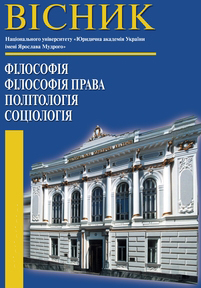ДО ПРОБЛЕМИ ОБҐРУНТУВАННЯ ПРОЦЕСУАЛЬНОСТІ ПРАВОВОГО ЖИТТЯ
ON THE ISSUE OF CONFIRMING PROCESS NATURE OF LEGAL LIFE
Author(s): Inna Igorivna Kovalenko, Eduard Anatoliyovych KalnytskyiSubject(s): Philosophy of Law
Published by: Національний юридичний університет імені Ярослава Мудрого
Keywords: social cognition; non-classical understanding of law; legal ontology;
Summary/Abstract: Problem setting. The modern understanding of law implies the need of new methods, which could correlate theoretical models of legal regulation and changes in the sociocultural context. Reference to the theoretical opportunities of phenomenology enables, in particular, to study the nature of the legal life procedural features, and the conditions of forming the image of atemporal legal structure.Recent research and publications analysis. Currently humanitarian knowledge includes a significant number of papers, devoted to the theoretical problems of studying the phenomenon of law. First of all, the authors emphasize that the field of philosophical- legal and legal studies is in the methodological crisis, determined by the uncertainty of the scientific status of the philosophy of law, one-sidedness of classical types of the law understanding, the incoherence of legal language and thinking styles etc. In addition, despite quite common use of the phenomenological methodology, the philosophy of law still lacks integrated concepts, enabling, inter alia, to find out ontological bases of legal life as a meaningful law configurate.Paper objective. The objective of the study is the analysis (as the initial stage of research) of the existing opinions on the problem of the process and structural nature insocial cognition to explain the nature of the law process, as well as further search for the ontological grounds of legal life.Paper main body. Phenomenological methods applied in studying legal life enable to suggest that law is of process nature, which is, in turn, comparable to the process nature of sensemaking. The search for the ontological grounds of legal life implies retrospective analysis of the issues, related to the research into structural and process properties in philosophy and phenomenology of law.The study of the works by E. Husserl shows that the philosopher confirmed the inner time of consciousness, but avoided considering reality itself from the standpoint of temporality, changeability and process. E. Husserl’s followers (N. Alekseev, А. Rainakh) believed that the legal meaning existed beyond the time context, but could be found within time when it was analyzed as a social phenomenon.The structural-functional approach and the systems theory show a number of difficulties, related to the conventionalism of the synchrony – diachrony dichotomy, the lack of considering the activity level of the subject of cognition, the openness of identifying the nature and mechanism of actual social changes, eclectics of cognition methods etc. The analysis of the process philosophy tradition (H. Bergson, N. О. Lossky, А. Whitehead) does not reveal clear arguments for the statement of the process nature of legal life either. It is due to the fact that process ontology is theoretically supported, on the one hand, by indestructibility of duration as an immanent property of the material world and the world of consciousness, on the other – by the need of elements beyond the time.Alternative approaches to solving the problem of the ontology of social phenomena (К. Popper, R. Nisbet, Ch. Tilly, I. Wallerstein, N. Luhmann, V. Ye. Kemerov etc.) demonstrate the transition from the basic image of the structural nature to the process nature as the essential subject of practical and pure problems of social reality consciousness. They try to integrate structural and process nature as the modes of social reality ontology.The analysis of theoretical and methodological arguments for the statement of the process nature of legal life enables to confirm that process is not its absolute substance. The phenomenon of legal life also shows structural properties, which, however, exist only within the process dimension. The availability of process-structure ontological dichotomy in the descriptions of legal life is determined by the fragmentariness of social existence. Legal structure is a virtual image, which is implemented as a process in the practices carried out by the subject of law. In turn, the description of legal processes suggests the«inclusion» of intentional structures, being in charge of articulation and sustainability of their perception.Conclusions of the research. The solution to the problem of searching legal life ontological grounds consists in generating integrative experience of law description and singling out two interrelated grounds: «law-structure» and «law-process» within the integrity of legal life.
Journal: Вісник НЮУ імені Ярослава Мудрого. Серія: Філософія, філософія права, політологія, соціологія
- Issue Year: 36/2018
- Issue No: 1
- Page Range: 65-89
- Page Count: 25
- Language: Ukrainian

